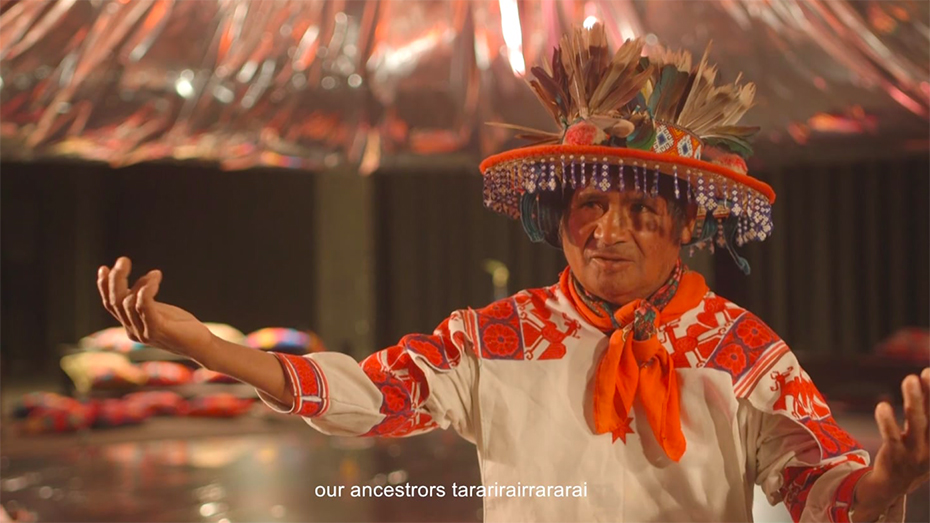School of the Jaguar
Endangered Human Movements Vol. 3
Endangered Human Movements
With the performance The Jaguar and the Snake, the workshop on Wixarrika dances, the lecture series The Jaguar Talks, and the healings as a form of activism, The School of the Jaguar offers new perspectives for thinking and experiencing the relationship between humans, animals, plants and the land.
500 years after the “conquest” of America and in the context of climate change and mass extinction, it is high time to take the world views of the First Nation peoples seriously, engaging with their true epistemic value beyond New-Age and Exoticism. The School of the Jaguar is thought of as an art world to rehearse the possibility of an ecology of knowledge.
The Jaguar Talks is a lecture series / conversation format where different perspectives meet in an attempt at decolonizing contemporary arts and culture, by introducing critical perspectives from the fields of anthropology, dance history, philosophy and body base practices from the realms of dance and choreography and contempo-traditional first nations knowledge. The later encompassing oral transmitted knowledge, social knowledge, knowledge about the body, about healing, about plants, about perception, about the landscape and also diplomatic knowledge applied to the relationships with beings other-than-human.
In a space where different forms of knowledge can enter in dialogue without the habitual hierarchies between them, The School of the Jaguar is brought about by the convergence of a group of people coming from anthropology, visual arts, choreography, philosophy, dance science, decolonial thought, dance and somatic practices and contemporary indigenous shamanism.
The Jaguar and the Snake
Performance
“The Jaguar and the Snake“
A performance piece inspired by the manifold beings who populate the Amerindian oral and visual imagery. Amanda Piña, Lina María Venegas and Yoan Sorin work on embodying Amerindian iconography, especially focusing on where animal, human and vegetal meet fuse and transform.
What other forms of relationships are possible between animals, humans and plants?
The performance explores how nature and culture are understood in Amerindian terms creating a visionary world at the crossroads between ancestral indigenous knowledge and contemporary performance art.
“The ethnologist Eduardo Viveiros de Castro, who has worked on the indigenous people of the Amazonas, can help us enter these reflections. For the latter, the original condition common to humans and animals is not animality, but humanity. The animals are ex-humans, the humans aren’t ex-animals. Where the West imagines itself a multiculturalism, a diversity of representations that has an influence on an external nature, one and total, Amerindians conceive the opposite: a representative unity, a purely pronominal phenomenology, apply indifferently on a real diversity. One single „culture“, multiple „natures“; constant epistemology, a changeable ontology. The point of view is found in the body. “
–
Delphine Albrecht
„(…) In sum, animals are people, or see themselves as persons. Such a notion is virtually always associated with the idea that the manifest form of each species is a mere envelope (a ‘clothing’) which conceals an internal human form, usually only visible to the eyes of the particular species or to certain trans-specific beings such as shamans.”
–
Cosmological Deixis and Amerindian Perspectivism, Eduardo Viveiros De Castro
Dancing like Wixarika
Workshop
A three-day workshop at the intersection between Amerindian ritual dances and somatic dance practices.
The workshop delivers movement structures coming from Wixarrika traditional dance and the choreographic materials that constitute the performance “The Jaguar and the Snake”.
The workshop participants are driven through different dances, exercises and practices which relate to trance like states and the disruption of the perception of lineal time. Central to the practices shared in the workshop is the generation and circulation of energy through movement, the exploration of changes in perception, and the embodiment of animal like states. The workshop also focus of sharing concepts related to Wixarrika dance and the and main principles which organize it.
With: Amanda Piña, Linda Samaraweerová and mara’ akáme
Juan Jose Katira Ramirez
The Jaguar Talks
Lectures Series
In this series of lectures we learn about the understanding of the body and the subject present in many native cultures across the Americas and its implications for the concept of identity, with a particular focus on the relationship between humans, animals and beings other-than-human. A Wixarika Mara’akame, political leader and ritual singer, a dancer, an anthropologist, a dance theorist, a decolonial scholar and a animal philosopher, share ideas about the notion of “sacred land”, the decolonization of the senses, about indigenous contemporaneity and ritual art, about animals, humans and plants and other forms of understanding those relationships.
With: Fahim Amir, Nicole Haitzinger, Johannes Neurath, Juan José Katira Ramirez, Amanda Piña, Rolando Vazquez.
Interview on the curatorial context and the piece
https://e-tcetera.be/dancing-with-a-deer-a-jaguar-or-a-snake/
Dates
Credits
Artistic Direction/Choreography: Amanda Piña
Installation: Daniel Zimmermann
Choreographic research: Amanda Piña, Linda Samaraweerova
Performance: Yoan Sorin, Lina Maria Venegas & Amanda Piña
Painting/Sculpture: Yoan Sorín
Music: Christian Müller
Costume/Stage: Lise Lendais
Light Design Stage: Victor Duran
Stage: Szymon Olsowski
Technical direction and construction: Jenny Schleif
Choreographic Contribution: Ewa Bankowska, Paula Chaves
Stage Modelling: Ines Kirchengast
Production Internship: Sophie Eidenberger
Production Management: Angela Vadori
Executive Production: Nora Soponyai
Lectures: Nicole Haitzinger, Fahim Amir, Johannes Neurath, Tulama Ramirez, Juan José Katira Ramirez, Amanda Piña, Rolando Vazquez
Workshop: Amanda Piña, Tulama Ramirez, Juan José Katira Ramirez
Production: nadaproductions.at
The School of the Jaguar is produced by nadaproductions, co-produced by deSingel Antwerpen and STUK Leuven and is funded by the City of Vienna (Kulturabteilung der Stadt Wien).
Endangered Human Movements Vol. 3 is co-produced by Tanzquartier Wien, EN KNAP Productions-Ljubljana and supported by Hellerau – Europäisches Zentrum der Künste-Dresden and Bundeskanzleramt – Kunst und Kultur (Austrian Federal Chancellery – Art and Culture).
MUSIC EXERPTS for The Jaguar and the Snake by Christian Müller
